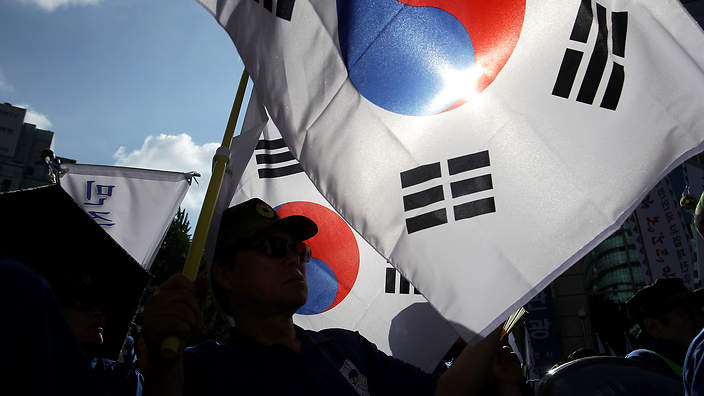South Korea’s Unhealthy Democracy: Regionalism

Even 28 years after South Korea’s free presidential elections in 1987, South Korean democracy cannot yet be considered healthy in 2015. South Korean political parties are roughly split on geographical lines, not on political difference[1]. Regionalism largely determines how voters will vote. As a result, Korean politicians have tended to focus on regional issues and remained tied to their home base. This focus on family and regional ties indirectly contributes to nepotism amongst the political elite.
The most pronounced regional cleavage is between the Kyongsang (southeast Korea) and Cholla (southwest Korea) regions. Most of modern Korean history was dominated by leaders from the Kyongsang region, including military dictators Park Chung-Hee and others[2]. Once in power, a disproportionate amount of government investment and focus was on the development of the Kyongsang region. People from the Kyongsang region were favored and promoted ahead of people from other regions for public office and government positions[3]. Kyongsang developed into Korea’s industrial heartland, whereas Cholla was neglected and its people stigmatized. Despite the election of President Kim Dae- Jung as the first president from the Cholla region, South Korea’s political parties continue to reflect regional differences.
This paper explains the origins of regionalism and why South Korean democracy is not healthy. Political parties in Korea are focused less on developing political agendas and more on emphasizing regional origins of their politicians. While political parties in Korea are ostensibly “conservative” (Kyongsang) and “liberal” (Cholla), their political ideologies are merely a façade for their regional politics. Indeed, the policies expressed by both parties have tended to be fluid, depending upon what appeals to the general public. Finally, this paper will cover the recent mayoral and regional elections of July 30th 2014, which seem to indicate that the strength of regional politics is starting to weaken.
Origins of regionalism
Historically, Korea was divided along regional lines with the Paekje (Cholla) and the Shilla (Kyongsang) fighting for control of the Korean peninsula. The Shilla eventually won and unified Korea, forcing many Paekje leaders to retreat to Japan[4]. In modern times, the Cholla region remained the main area of political opposition, which sometimes became violent (Gwangju – capital of Cholla – incident of 1980). The people of Cholla felt isolated and victimized by the government[5]. This has been reflected in their voting patterns, which heavily favored candidates from the Cholla region – getting over 90% of the votes.
The Plague or Curse of regionalism
While all politics are somewhat dependent on a hometown advantage, with each region having its own unique brand and cultural differences, excessive focus on regionalism has been a political plague in South Korea. Political parties in Korea have little loyalty to ideology or agendas. Instead, politicians focus on loyalty to individuals and regional issues. As a result, parties are easily dissolved and new parties formed[6]. Politicians mostly exploit past grievances in order to garner support. Although it is important not to forget the past, living in the past is not healthy for future development.
Regionalism, combined with cronyism, nepotism, and factionalism, ultimately leads to corruption. Consider the following facts: of the 1,475 government officials of grade 4 or higher in all 14 regions and special cities and provinces (excluding Seoul the capital and Gyonggido province), over 80 percent graduated from their local high schools and have maintained their exclusive local ties ever since their bureaucratic careers began in the 1990s[7]. Both regions have serious issues when appointing local bureaucrats, since local ties are more important than qualifications. (For Cholla, it was close to 100 percent.[8])
In comparison, only 36% of officials in Seoul are from Seoul – meaning that 74% of bureaucrats are from other parts of Korea[9]. Practices of both the Kyongsang and Cholla provinces reflect tribal traditions where they would select relatives or friends over qualified outsiders. As a result, animosity and antagonism towards other regions reflects the worst characteristics of people who are voting almost solely for their favorite local son. Political parties do not produce political agendas but simply appeal to sentiment favoring local candidates.
Hope of resolving regional divide?
The recent July 30th, 2014, mayoral and regional elections results were very interesting. For the first time, a conservative party candidate, Lee Jung Hyun, won in the Goksong county in Cholla. Liberal candidates Busan and Daegu (Kyongsang Province) were able to garner close to 40% of the votes[10]. These results were driven by a different voting pattern, where young voters focused more on policies and the quality of the candidates, rather than their regional origins. Voters are tired of regional politics and want to see more regional harmony, as well as a better political environment. This is a very small step in the right direction but also represents a significant improvement from the past.
______________________________
Works Cited
Ha-Yong, Chool. “Impact of Democratization on Regionalism in Korea: A Complex Interplay.” New Paradigm for Transpacific Collaboration. Print.
Huer, Jon. “Curse of Korea’s Regionalism.” Korea Times. 16 Aug. 2009. Web. 12 Feb. 2015. <http://www.koreatimes.co.kr/www/news/opinon/2013/05/272_50182.html>.
Lewis, Martin. “Intense Regionalism in the South Korean Presidential Election of 2012.” GeoCurrents. 19 Feb. 2013. Web. 12 Feb. 2015. <http://www.geocurrents.info/geopolitics/elections/intense-regionalism-in-the-south-korean-presidential-election-of-2012>.
Wang, Juan. “Local and Regional Politics of South Korea.” McGill University. Leacock, Montreal. 28 Jan. 2015. Lecture.
정, 규재. “정규재 TV.” 정규재TV. 31 July 2014. Web. 12 Feb. 2015. <http://jkjtv.hankyung.com/board/view.php?id=jkjtv_column&no=1338&category=2&page=1>.
[1] Wang, Juan. “Local and Regional Politics of South Korea.” McGill University. Leacock,
Montreal. 28 Jan. 2015. Lecture.
[2] Ha-Yong, Chool. “Impact of Democratization on Regionalism in Korea: A Complex
Interplay.” New Paradigm for Transpacific Collaboration. Print.
[3] Ibid.
[4] Huer, Jon. “Curse of Korea’s Regionalism.” Korea Times. 16 Aug. 2009. Web. 12 Feb. 2015.
[5] Ibid.
[6] Wang, Ibid.
[7] Huer, Ibid.
[8] Ibid.
[9] Ibid.
[10] 정, 규재. “정규재 TV.” 정규재TV. 31 July 2014. Web. 12 Feb. 2015.
Image Source:
1) SBS: http://www.sbs.com.au/news/article/2013/10/09/comment-fragility-south-korea-democracy-exposed
2) The Economist: http://www.economist.com/node/2560533

